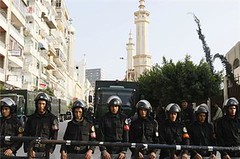
Egyptian riot police move into formation in order to prevent the masses from demonstrating on Jan. 25, 2011. The workers and youth of North Africa and the Arabian Peninsula have rose in opposition to the western-backed regimes in the region.
Originally uploaded by Pan-African News Wire File Photos
Last updated at 00:48 ET
Egypt protests: Police disperse Cairo crowds
Egyptian police have used tear gas and water cannon to break up rare anti-government protests in the capital.
Thousands of people had joined the protests in Cairo, inspired by the uprising in Tunisia and vowing to stay in place until the government fell.
At least three people are reported to have been killed during Tuesday's "day of revolt" across the country.
The US has urged the government to be "responsive to the aspirations of the Egyptian people".
Protests are uncommon in Egypt, which President Hosni Mubarak has ruled since 1981, tolerating little dissent.
Tuesday's event had been co-ordinated on a Facebook page, where the organisers said they were taking a stand against torture, poverty, corruption and unemployment.
They said that the rally would mark "the beginning of the end".
The BBC's Jon Leyne in Cairo said that it had been unclear how many people would respond to the online call, but in the end, the turnout was more than the organisers could have hoped.
Police were taken aback by the anger of the crowd and let protesters make their way to Tahrir Square near the parliament building, he says.
'Mubarak the coward'
The crowds' anger was largely focused on the president, with thousands calling for his resignation and "Down with Mubarak" scrawled on the walls of buildings.
"We are glued to the ground here in Tahrir and will not move, not tomorrow, not the day, after until this government falls," one 35-year-old shopkeeper was quoted by Reuters as saying.
State TV said one policeman had died in clashes.
But at 0100 local time (2300 GMT Tuesday) police moved in, firing tear gas and driving protesters into nearby streets. There were reports that some people had been beaten by police.
As dawn neared, Tahrir Square was reported to be empty of demonstrators, with cleaners removing rocks and litter as police looked on.
Protests were also held out in other areas of the country on Tuesday, including the eastern city of Ismailiya.
Thousands joined protests in the northern port city of Alexandria, some chanting: "Revolution, revolution, like a volcano, against Mubarak the coward."
Two protesters died in Suez, doctors there said.
The US White House said the Egyptian government had "an important opportunity to be responsive to the aspirations of the Egyptian people".
In a statement, it said Egypt should "pursue political, economic and social reforms that can improve their lives and help Egypt prosper."
"The United States is committed to working with Egypt and the Egyptian people to advance these goals," it added.
US Secretary of State Hillary Clinton said her administration supported "the fundamental right of expression and assembly" and urged all parties "to exercise restraint".
She added that Washington believed the Egyptian government was "stable" and "looking for ways to respond to the legitimate needs and interests of the Egyptian people".
'Rudderless' opposition
Protesters in Alexandria defaced pictures of President Hosni Mubarak The Egyptian government said it had allowed the protesters "to voice their demands and exercise their freedom of expression".
It blamed the violence on the banned Islamist movement the Muslim Brotherhood, saying its supporters "began to riot, damage public public property and throw stones at police forces".
However, our correspondent says that one opposition leader, Mohamed ElBaradei, had called on Egyptians to take part in these protests, the Muslim Brotherhood had been more ambivalent.
Tunisia's President Zine al-Abidine Ben Ali was ousted from power and fled the country earlier this month, after weeks of protests in which dozens of people were killed.
Egypt has many of the same social and political problems that brought about the unrest in Tunisia - rising food prices, high unemployment and anger at official corruption.
However, the population of Egypt has a much lower level of education than Tunisia. Illiteracy is high and internet penetration is low.
There are deep frustrations in Egyptian society, our Cairo correspondent says, yet Egyptians are almost as disillusioned with the opposition as they are with the government; even the Muslim Brotherhood seems rudderless.
Our correspondent adds that Egypt is widely seen to have lost power, status and prestige in the three decades of President Mubarak's rule.
No comments:
Post a Comment